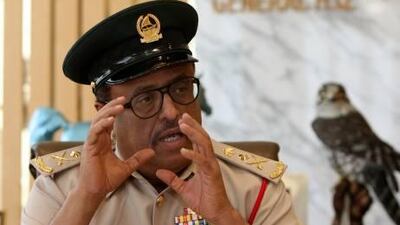DUBAI // Dubai Police will pay Dh200,000 blood money to secure the release from prison of a man responsible for a car accident in which his wife died.
Joseph Abutan, from the Philippines, was convicted of causing the accidental death in 2009. He was ordered to serve a year in prison and pay blood money to his wife’s family.
Mr Abutan was due to be released on December 28, 2009, but remained in jail because he could not afford to pay the blood money and the family would not renounce their right to it. He converted to Islam last year.
On Sunday Mr Abutan made a TV appeal to Lt Gen Dahi Khalfan Tamim, the Chief of Dubai Police, asking him to order the payment on humanitarian grounds. Gen Tamim issued the order yesterday.
Maj Gen Mohammed al Suwaidi, the director of correctional facilities administration at Dubai Police, said a number of prisoners in non-criminal cases spent time in prison over and above their sentences because they could not pay court-ordered fines. He would not say how many.
“Prisoners who have been convicted in civil or financial cases remain in prison until their court payments are delivered. Such humanitarian efforts by the chief are not new to Dubai police,” he said.
“The correctional facilities administration, the humanitarian services committee and the media department follow and investigate such cases.”
More than Dh1 million was donated to the Dubai Police Humanitarian Services Committee in 2010, said Maj Marwan Julphar of the Prisons Security Department.
“People have donated these sums in good faith, mostly to help in the release of prisoners who are incarcerated for their inability to pay blood money,” Maj Julphar said. “Such efforts raise the spirits of the prisoners and guide them to return to society as reformed persons.”
Major Julphar also said the committee had arranged ties with charity organisations such as the Mohammed bin Rashid Humanitarian Services Foundation, the Al Maktoum Charity, the Red Crescent. Dubai Islamic Bank and Dar al Bir.
“We are co-ordinating with these organisations to help in the prisoners’ humanitarian issues especially in cases involving people with families who they provide for and arrange for resolutions between them and the plaintiffs, as well as providing air tickets for deportees,” he said.

